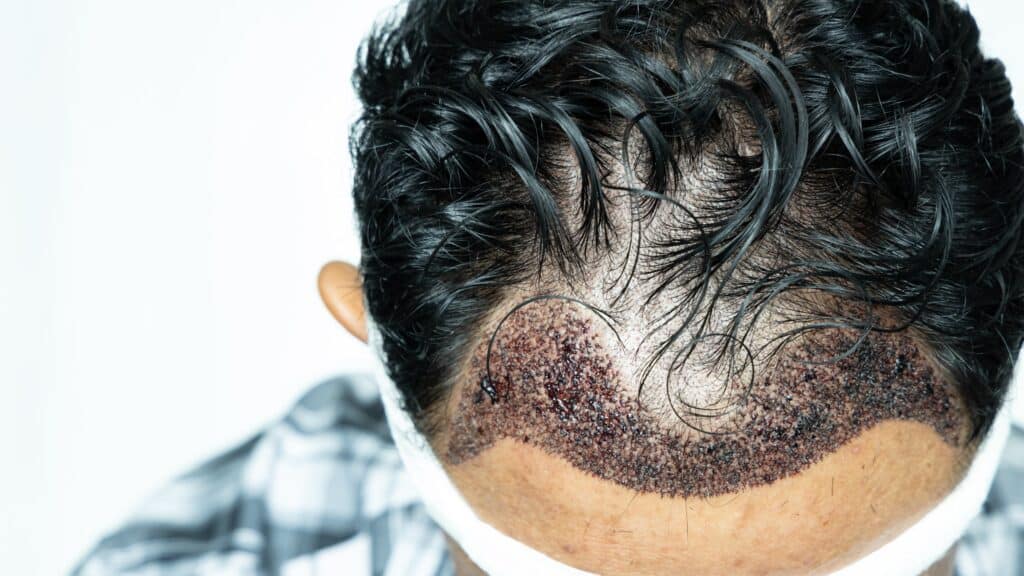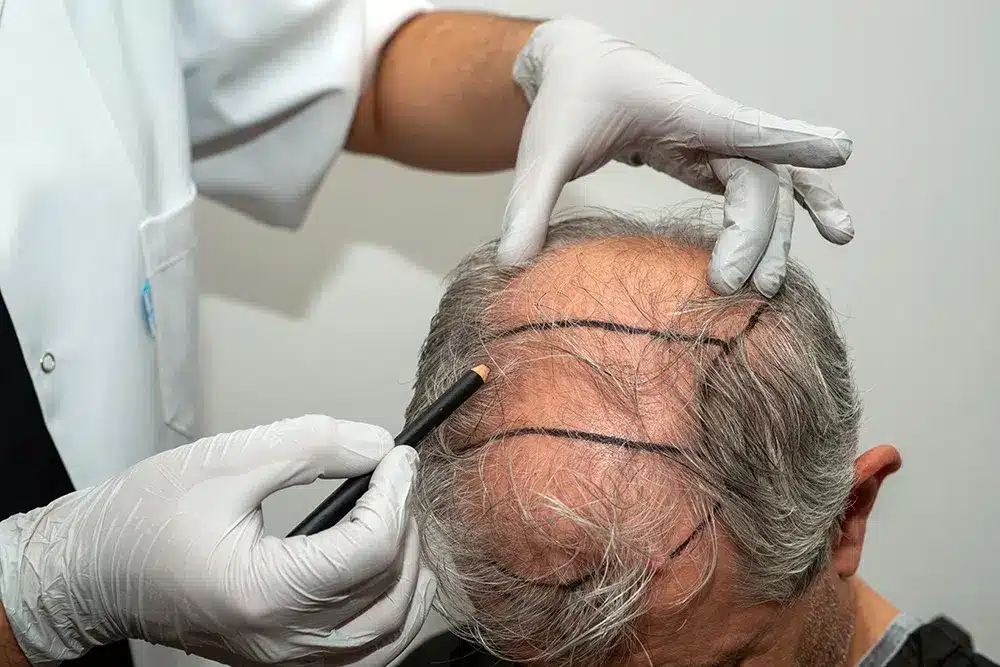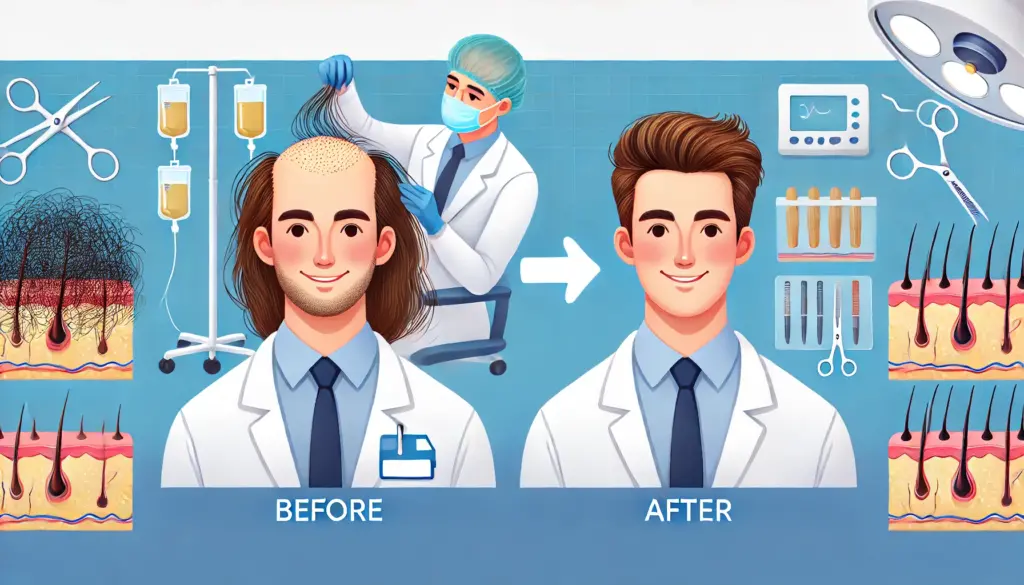Hair loss can be a frustrating and sometimes alarming experience. While genetics play a role for some, many people experience temporary hair shedding due to stress. This blog delves into the surprising connection between stress and hair loss, helping you understand what’s happening and what you can do about it.
There are various types of hair loss, but today we’ll focus on telogen effluvium, a temporary condition triggered by life stressors. Unlike pattern baldness, which follows a specific pattern (receding hairline for men, thinning at the crown for women), stress-related hair loss often results in sudden, diffuse thinning across the scalp. Let’s explore how stress disrupts your hair growth cycle and what steps you can take to get your hair back on track.
Table of Contents
Does Hair Grow Back After Falling Out From Stress?
Hair loss can be a major cause for concern, especially when it seems to be happening out of the blue. The good news is, if stress is the culprit behind your thinning locks, there’s a strong chance your hair will grow back healthy and strong. Here’s why stress can trigger hair loss and how it usually resolves itself. Just think that your hair goes through a constant cycle with three distinct phases:
- Anagen (Growth Phase): This is when your hair follicles are actively producing new hair cells, leading to hair growth. This phase can last for 2-7 years, determining the length of your hair.
- Catagen (Transition Phase): This short phase (around 2 weeks) marks the transition where hair growth slows down and the follicle prepares to detach from the blood supply.
- Telogen (Resting Phase): In this final phase, lasting about 3 months, the hair follicle is essentially dormant, and the existing hair strand eventually sheds naturally to make way for new growth.
Chronic stress throws a wrench into this well-oiled system. When your body is under constant pressure, it prioritizes immediate needs like survival over non-essential functions like hair growth. The stress hormone cortisol can disrupt the hair growth cycle, pushing a larger number of follicles prematurely into the telogen phase, leading to increased shedding.
The key here is understanding the type of hair loss you’re experiencing. If it’s stress-related, it’s categorized as telogen effluvium (TE). TE is a temporary condition where the increased shedding typically occurs 2-3 months after the stressful event. Once the stressor subsides and your body returns to a balanced state, the hair growth cycle normalizes. This allows the hair follicles to regain their function and resume producing new hair.
While the exact timeframe can vary depending on the severity of stress and individual factors, hair typically starts growing back within 3-6 months after the stressful event is resolved. You might notice some initial “baby hairs” as a sign of new growth, followed by a gradual return to your normal hair density.

How To Know If Hair Loss Is Due To Stress?
Hair loss can be a telltale sign of various factors, and stress can be a surprising culprit. While losing a few strands daily is normal, noticing a sudden increase in shedding can be alarming. Here’s how to decipher if stress might be playing a role in your hair loss.
- Sudden and Diffuse Thinning: Unlike genetic hair loss, which typically follows a specific pattern (receding hairline for men, thinning at the crown for women), stress-related hair loss often presents as sudden and diffuse thinning across the scalp. This means you might notice more hair coming out during brushing or showering, and the hair loss appears evenly distributed rather than concentrated in specific areas.
- No Receding Hairline: Pay attention to the hairline itself. Genetic hair loss usually involves a gradual receding hairline in men and thinning at the crown for women. If your hairline remains stable while experiencing hair loss elsewhere, stress might be the cause.
- Increased Shedding: You might notice a significant increase in hair coming out during daily activities like combing, showering, or styling. This shedding is likely to be more noticeable than the usual 50-100 strands lost daily.
Hair loss isn’t always the only indicator of stress. Often, it’s accompanied by other stress-related symptoms. Here are some additional signs to consider:
- Difficulty Sleeping: Stress can disrupt your sleep patterns, making it difficult to fall asleep or stay asleep throughout the night.
- Changes in Appetite: Some people experience increased appetite or cravings under stress, while others may lose their appetite altogether.
- Anxiety: Feeling anxious, restless, or on edge are all common symptoms of stress.
- Fatigue: Chronic stress can leave you feeling drained and lacking energy.
- Concentration Issues: It can be difficult to focus or concentrate when you’re stressed.
If you’re experiencing sudden, diffuse hair loss and suspect stress might be the trigger, consider the additional stress-related symptoms mentioned above. If multiple symptoms align, it’s highly likely that stress is contributing to your hair loss. However, consulting a dermatologist or trichology’s (hair loss specialist) is always recommended for a definitive diagnosis. They can rule out other potential causes of hair loss and offer personalized treatment recommendations.

How To Stop Your Hair From Falling Out From Stress?
Hair loss can be a frustrating and sometimes alarming experience. While genetics and certain medical conditions can be culprits, stress often plays a surprising role. The good news is, stress-induced hair loss (telogen effluvium) is typically temporary. By adopting a multi-pronged approach that tackles stress and promotes hair health, you can create an environment for your hair to thrive.
Stress disrupts the natural hair growth cycle, pushing hair follicles prematurely into a resting phase and leading to increased shedding. Here’s how to combat stress and promote hair health:
1- Stress Management Techniques:
- Meditation: This practice helps quiet the mind, reduce cortisol (stress hormone) levels, and promote relaxation. Guided meditations are readily available online or through apps.
- Yoga: Combining physical postures with controlled breathing and meditation, yoga offers a holistic approach to stress management and can improve blood circulation, which benefits hair follicles.
- Deep Breathing: Simple yet powerful, deep breathing exercises can quickly induce relaxation. Focus on slow, steady breaths in through your nose and out through your mouth, engaging your diaphragm.
- Spend Time in Nature: Immerse yourself in the calming effects of nature. Take walks in the park, hike in the woods, or simply sit outside and listen to the sounds of nature.
2 – Nourishing Your Hair From Within:
A balanced diet rich in essential nutrients fuels hair growth. Here’s how your diet can contribute to healthy hair:
- Protein: Hair is primarily composed of protein, so incorporate lean proteins like chicken, fish, lentils, and beans regularly.
- Iron: Iron deficiency can contribute to hair loss. Include iron-rich foods like eggs, spinach, red meat, and fortified cereals.
- Vitamins B Complex: B vitamins support cell production and hair growth. Opt for whole grains, leafy greens, nuts, and bananas.
- Vitamin D: Studies suggest a link between vitamin D deficiency and hair loss. Consider incorporating vitamin D-rich foods like fatty fish or consult your doctor about potential supplementation.
- Omega-3 Fatty Acids: These healthy fats contribute to scalp health and circulation. Include omega-3-rich foods like salmon, flaxseeds, and walnuts in your diet.
3 – Gentle Scalp Care For Healthy Hair:
The scalp is the foundation for healthy hair growth. Here are some tips for gentle scalp care:
- Scalp Massages: Regular scalp massages can stimulate blood circulation to the scalp, promoting hair follicle health. Use your fingertips to gently massage your scalp in circular motions for a few minutes daily.
- Shampooing: Choose a gentle, sulfate-free shampoo suitable for your hair type. Wash your hair regularly to remove dirt and build-up, but avoid over-washing, which can strip away natural oils.
- Conditioning: Conditioning helps keep hair hydrated and prevents breakage, which can worsen the appearance of hair loss.
- Minimize Heat Styling: Excessive heat styling with blow dryers, straighteners, or curling irons can damage hair and contribute to breakage. Opt for air-drying whenever possible or use heat protectants before styling.
4 – Adequate Sleep:
Aim for 7-8 hours of quality sleep each night. During sleep, your body repairs and restores itself, including hair follicles. Develop a consistent sleep schedule to regulate your sleep-wake cycle and ensure restful sleep.
5 – Consider Supplements:
While a balanced diet is the primary source of nutrients for hair health, some individuals might benefit from additional support. Biotin is a popular hair-supporting supplement, but it’s crucial to consult with your doctor before starting any supplements to ensure they’re safe and appropriate for you.
Remember! Stress-Induced Hair Loss Requires A Holistic Approach
Stress-induced hair loss requires a holistic approach. By implementing stress management techniques, maintaining a healthy diet, practicing gentle scalp care, and ensuring adequate sleep, you can create the ideal environment for hair growth. Be patient and consistent with your efforts. It may take several weeks or months to see noticeable improvement, but with commitment, you can regain a healthy, full head of hair.
- Manage Underlying Medical Conditions: Certain medical conditions can contribute to hair loss. If you have a pre-existing condition, ensure it’s properly managed to minimize its impact on your hair health.
- Consult a Dermatologist or Trichologist: If your hair loss persists despite implementing these strategies, consider consulting a dermatologist or trichologist (hair loss specialist) for a definitive diagnosis and personalized treatment recommendations.
These techniques, along with a good outlook and persistence, can help you manage stress, increase the growth of your best hair yet, and improve general health.
How To Stop Worrying About Hair Loss?
Hair loss can be a deeply emotional experience. It’s natural to feel anxious or insecure, especially when it seems to be happening rapidly. However, before you spiral into worry, take a deep breath and shift your focus.
Remember, stress-induced hair loss (telogen effluvium) is typically temporary. Once the stressor subsides and your body returns to a balanced state, hair growth usually resumes within a few months.
Ironically, worrying about hair loss can actually exacerbate the problem. Stress releases cortisol, a hormone that can disrupt the hair growth cycle. Therefore, focusing on stress management becomes doubly important.
Instead of dwelling on hair loss, shift your focus to self-care and healthy habits that benefit not just your hair, but your overall well-being. This includes:
- Stress Management: Practice relaxation techniques like meditation or yoga.
- Nourishing Diet: Eat a balanced diet rich in essential nutrients for hair growth.
- Gentle Scalp Care: Maintain a gentle scalp care routine that promotes healthy hair follicles.
- Quality Sleep: Aim for 7-8 hours of quality sleep each night.
Remember, hair regrowth takes time. Be patient with yourself and celebrate small improvements. Most importantly, focus on self-love and acceptance. Your worth isn’t defined by the amount of hair on your head.
You may foster a favorable environment for good hair growth by putting your health first and forming healthy habits. Investigate hairstyles that enhance your confidence and complement the form of your face in the interim. Concentrate on the constructive adjustments you’re making, and have faith that your hair will cooperate.
Is My Hair Loss Stress Or Genetic? Why It Can Be A Confusing Experience
Hair loss can be a confusing experience, leaving you wondering if stress is the culprit or if genetics are playing a hand. Here’s how to differentiate between stress-induced and genetic hair loss:
1- Stress-Induced Hair Loss (Telogen Effluvium):
- Temporary: This is the good news! Stress-related hair loss is typically temporary. Once the stressor subsides and your body finds balance again, hair growth usually resumes within 3-6 months.
- Diffuse Thinning: Unlike genetic hair loss, stress-induced hair loss presents as sudden, diffuse thinning across the scalp. This means you might notice more hair coming out during brushing or showering, and the hair loss appears evenly distributed rather than concentrated in specific areas.
2- Genetic Hair Loss (Pattern Baldness):
- Progressive: This is a long-term condition. While some treatments can slow progression, it’s a lifelong concern.
- Specific Pattern: Genetic hair loss, also known as pattern baldness, follows a predictable pattern. Men typically experience a receding hairline, while women experience thinning at the crown.
If your hair loss is severe, persistent, or you’re unsure about the cause, consulting a dermatologist or trichologist (hair loss specialist) is highly recommended.
Here Are The Benefits of Professional Consultation:
While this information is valuable, a dermatologist can offer even greater benefits. A physical examination and potentially some blood tests will allow them to pinpoint the exact cause of your hair loss. An accurate diagnosis is crucial for finding the most effective treatment. Depending on the cause, a dermatologist can recommend various options, topical medications, minoxidil, finasteride (for men only), platelet-rich plasma (PRP) therapy, or even hair transplantation.
Most importantly, knowing the cause of your hair loss can empower you to explore the best treatment for your specific situation. Remember, early intervention is key. If you’re worried about hair loss, don’t hesitate to seek professional guidance. A dermatologist can help you understand the cause and recommend personalized treatment options to keep your hair healthy and strong.
Conclusion: Hair Loss Due To Stress (Telogen Effluvium) Is Usually Temporary
Hair loss due to stress (telogen effluvium) is usually temporary. While it can be unsettling, the good news is your hair can grow back once the stressor subsides. The key is prioritizing stress management and healthy habits. Stress management techniques like meditation, yoga, and deep breathing can lower cortisol levels, promoting hair growth. A balanced diet rich in protein, iron, B vitamins, vitamin D, and omega-3 fatty acids nourishes your scalp and hair follicles. Gentle scalp massages and a hair care routine that avoids harsh chemicals and excessive heat styling further support healthy hair growth.

